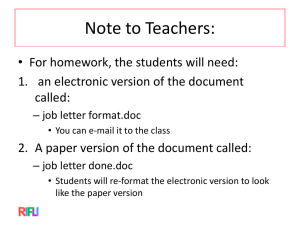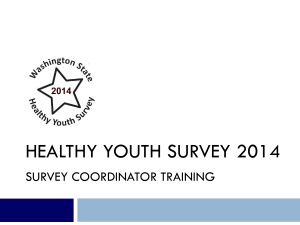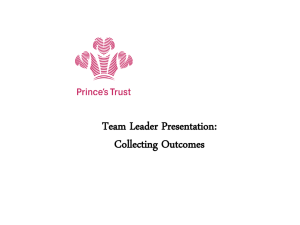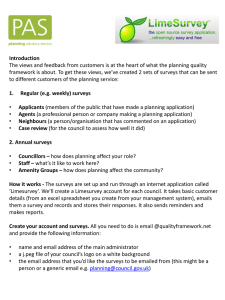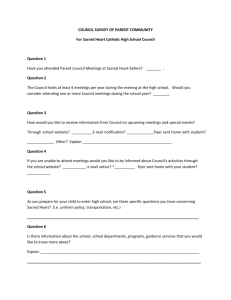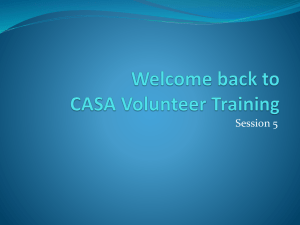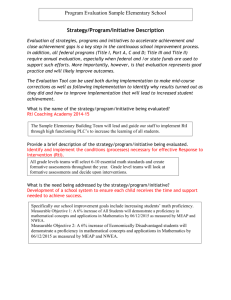evidence handbook
advertisement
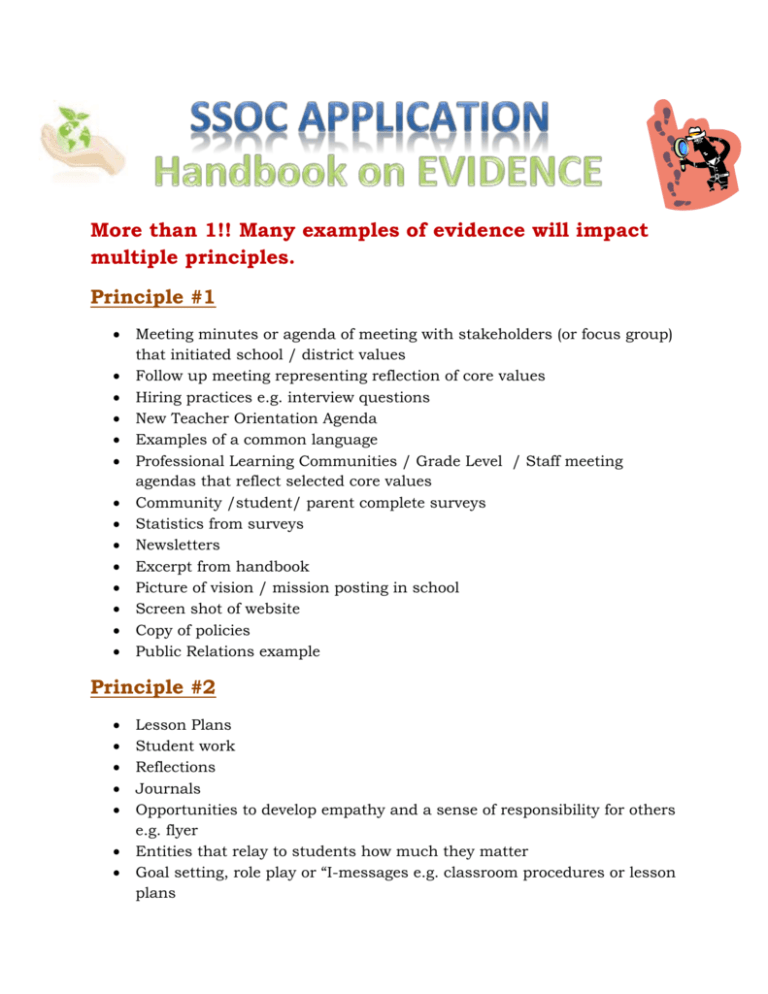
More than 1!! Many examples of evidence will impact multiple principles. Principle #1 Meeting minutes or agenda of meeting with stakeholders (or focus group) that initiated school / district values Follow up meeting representing reflection of core values Hiring practices e.g. interview questions New Teacher Orientation Agenda Examples of a common language Professional Learning Communities / Grade Level / Staff meeting agendas that reflect selected core values Community /student/ parent complete surveys Statistics from surveys Newsletters Excerpt from handbook Picture of vision / mission posting in school Screen shot of website Copy of policies Public Relations example Principle #2 Lesson Plans Student work Reflections Journals Opportunities to develop empathy and a sense of responsibility for others e.g. flyer Entities that relay to students how much they matter Goal setting, role play or “I-messages e.g. classroom procedures or lesson plans Mentoring / tutoring programs e.g. flyer Class meeting agendas Peer mediation e.g. flyer Cooperative Learning Service Learning Paperwork Conflict resolution program Goal setting charts Copy of Procedures Principle #3 Professional Learning Communities / Grade Level / Staff meeting agendas that reflect selected core values School Improvement Plan excerpts Strategic Plan excerpts District definition of character (website screen shot) Photographs of classroom procedures posted Lesson plans on proper citations and sources and plagiarism Testing strategies that are implemented to resist cheating e.g. Agenda item Picture of honor pledge or honor codes Honor committees or courts agenda A copy of extracurricular and sports requirements of participation Bus procedures Sportsmanship codes Publication code of ethics Club bylaws Lesson Plans Curriculum Frameworks Principle #4 Community /student/ teacher /parent complete surveys Staff attendance at school events e.g. pictures Provisions for class meeting and conferences e.g. schedules Mentoring / Tutoring programs e.g. flyer Anti – Bullying Program e.g. flyer Zero tolerance e.g. handbook Conflict resolution e.g. handbook Peer mediation e.g. flyer Entities that reflect respect for personal, economic, and cultural differences Agendas of or invitations to celebrations of successes Principle #5 Service Learning Expectations e.g. handbook Conflict Resolution e.g. handbook Sportsmanship codes Honor codes Student Leadership opportunities e.g. flyer Student Voice and Choice e.g. flyer Lesson Plans Curriculum Reflections e.g. student or teacher work Community service e.g. flyer Peer mediation e.g. flyer Alignment between service and curriculum e.g. form Community surveys Principle #6 Curriculum Lesson Plans Unit Plans Project / Problem Based Learning Student Examples and opportunities Parent / Student surveys Syllabus that reflects course expectations Rubrics Authentic student products that reflect genuine depth of understanding Student Voice and Choice e.g. flyer Class meetings agendas or minutes Examples of differentiation Self-management illustrations Examples of what is being done to eliminate achievement gaps Opportunities for collaboration Principle #7 Student surveys Reflections Revised student work that includes teacher feedback Evidence of Public Relations programs Teacher guidelines in citations and prevention of plagiarism Student Government Associations Agenda Class meeting’s agenda Conflict resolution Program e.g. flyer Copy of behavioral norms and rules Photographs of student initiatives e.g. petitions Examples of how teachers encourage students to be proud of their work and that pride is their soul motivation Staff Training / Professional Development agendas Discipline codes Infractions that are tied to reflections on values Evidence of student roles in the management of classrooms Principle #8 Parent, student and staff surveys Reflections Professional Development offering and opportunities and participation turn our Agendas for Grade Level meetings, Professional Learning Communities and Faculty meetings Attendance records at meetings that reflect the collaborative presence between administration and staff Any and all documentation generated by Character Education committees that represent all stakeholders Teacher Schedules School calendars Volunteer opportunities and participant records reflecting all stakeholders volunteer Principle #9 Agendas for Grade Level meetings, Professional Learning Communities and Faculty meetings Hiring practices for administrators e.g. interview questions Excerpt from handbook Picture of vision / mission posting in school Screen shot of website Copy of policies Agendas for Grade Level meetings, Professional Learning Communities and Faculty meetings Attendance records at meetings that reflect the collaborative presence between administration and staff Any and all documentation generated by Character Education committees that represent all stakeholders Volunteer opportunities and participant records reflecting all stakeholders volunteer Public Relations example Community surveys Principle #10 Parent and staff surveys Volunteer opportunities and participant records reflecting all stakeholders volunteer Any and all documentation generated by Character Education committees that represent all stakeholders Agendas for Parent Workshops Report cards Emails Newsletters Websites Conferences: Parent/Student/Teacher Public Relations example Community surveys Principle #11 Community /student/ teacher /parent complete surveys Reflections Strategic Action Plans before and after surveys School Improvement Plan before and after surveys Report cards Parent Conferences Goal Setting Disciplinary referrals Detention and Suspension statistics

